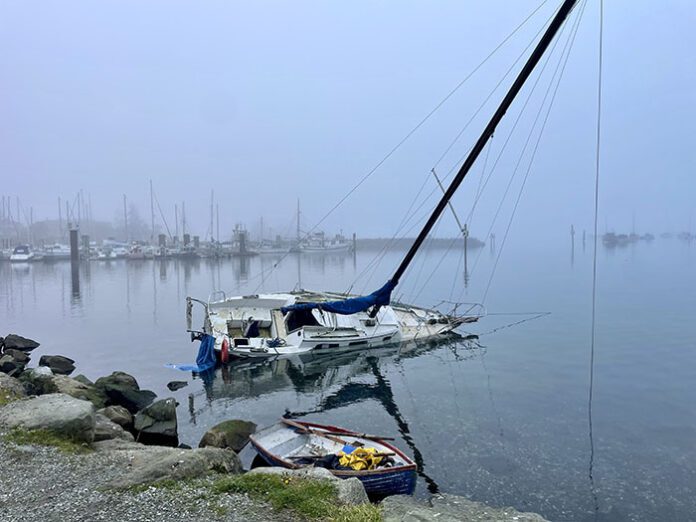Concerns and complaints continue over non-permitted uses at Ganges Harbour, according to local Islands Trust staff, who say federal efforts at cleaning up derelict vessels from Salt Spring’s waters are being thwarted by quick-acting harbour users.
Appearing remotely before Salt Spring Island’s Local Trust Committee (LTC) for a regular report Thursday, Dec. 12, Islands Trust bylaw compliance and enforcement manager Warren Dingman told trustees bylaw enforcement staff have been working to document and enforce on vessels and structures swinging from non-permitted mooring buoys within the shoreline “S8” zone.
“And Transport Canada staff are doing regular visits to the harbour,” said Dingman, “to try to remove derelict boats and non-permitted floats.”
But those efforts are hampered, he said, by harbour users claiming abandoned vessels once they’ve been tagged for removal –– a necessary step by Transport Canada that has been seen by some as a signal to come aboard.
“This means that some of the vessels remain in the harbour,” said Dingman.
Another issue has been how much of Transport Canada’s limited budget is expended on the tipping fees for disposing of derelict vessels at various landfills. Dingman said they were working to connect with the regional district’s landfill operators to hopefully get some of those fees waived.
“I think Transport Canada staff are doing an excellent job doing regular patrols and work in Ganges Harbour to try to remove the non-permitted structures and the derelict boats,” said Dingman. “And regarding that, they really have the most authority; they’re working hard to clean up the harbour.”
Earlier this month, Salt Spring’s Local Community Commission (LCC) had directed a letter to the LTC, advising trustees of commissioners’ desire to include a discussion of “opportunities to collaborate” on potential management of private mooring buoys, long-term use and liveaboards in Salt Spring Island’s small craft harbours in the two bodies’ next joint meeting.
“I think it’s important to make sure a Salt Spring perspective is right at the forefront,” said LCC member Brian Webster Dec. 5. “Working collaboratively with the LTC on how we’re going to do it together, speaking with one voice to the regional process –– maybe have consensus in our community that can be a strong, clear voice.”
That joint session will come in early 2025. Meanwhile, on bylaw enforcement more broadly, Dingman reported Salt Spring had 202 files open as of December, down from 233 at this time last year. Over the course of the year, he said, a large number of non-permitted dwelling files were closed as directed by the LTC –– although per that direction, enforcement did not halt where there were concerns about health and safety, lack of proper sewage disposal or an excessive number of travel trailers on a property.
The greatest number of open files, according to the report, are still about short-term vacation rentals (STVRs), with trustees having directed staff to focus on operations without resident operators on the property. Of 71 current STVR-related files, just 25 involve such situations. The remainder, according to Dingman, are open due to contraventions of land use bylaw regulations, such as the use of accessory buildings for the STVR operation.

